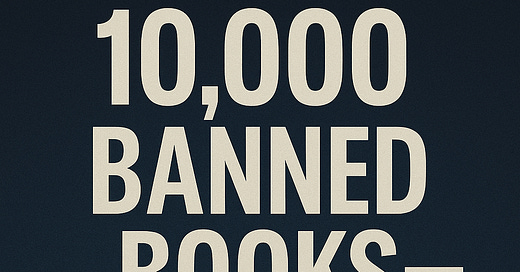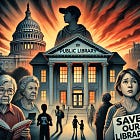10,000 Banned Books & Barely a Headline: Inside Trump’s War on Truth
What happens when the Administration decides what you can read?
This is one of the most underreported crises in America today.
While national headlines obsess over polls, palace intrigue, and political theater, a quieter but more dangerous campaign is underway: the systematic erasure of knowledge. Books are disappearing from American schools, libraries, and even federal institutions, and the media is barely covering it.
The numbers are staggering, but what’s more alarming is the silence. Because while this is happening in plain sight, it's barely a blip in mainstream media coverage.
Under the Trump administration, book banning has evolved from scattered school board skirmishes into a full-scale federal movement to silence marginalized voices, rewrite the national narrative, and reshape the American mind. Between August 2023 and May 2024, public schools across 29 states recorded over 10,000 book bans, a nearly threefold increase from the year before.
This isn’t about protecting children. It’s about protecting a worldview that can’t survive scrutiny.
We just hit 13,000 subscribers—thank you! To celebrate, we’re offering full access to The Coffman Chronicle at 50% off.
Get exclusive analysis and fearless reporting you won’t find in corporate media.
An Unprecedented Surge in Book Bans
According to a report released by PEN America in May 2025, there were 10,046 instances of book bans in 220 public school districts, affecting more than 4,200 unique titles. Florida and Iowa alone accounted for over 8,000 of these cases.
Meanwhile, the American Library Association tracked over 2,400 unique titles challenged in libraries throughout 202, most of them by pressure groups with political backing.
The targets are not accidental:
44% feature authors or characters of color.
39% center LGBTQ+ narratives.
57% address sex education, puberty, or sexual violence.
This isn’t about explicit content. It’s about erasing content that centers truth outside the white, heteronormative, patriarchal frame.
Here at the Coffman Chronicles, we’ve been reporting on this for months. See some of our reporting here:
Note: This articles are more than 45 days old and now live in our archive. Consider becoming a paid subscriber for the nearly 600 article archive, exclusive content, and occasional early access.
Federalized Censorship: The Trump Doctrine
What makes this era different is not just the volume of bans—but their orchestration.
Starting in January 2025, Trump’s Department of Education eliminated key oversight roles, dismissed complaints related to book censorship, and branded critics of these policies as participants in a “Biden book ban hoax.”
Military academies soon followed suit. Between February and April 2025, the U.S. Naval Academy removed 381 titles, including I Know Why the Caged Bird Sings and How to Be an Antiracist, in compliance with executive orders gutting DEI initiatives. Following intense backlash and a Pentagon review in late April 2025, only some were restored.
This is not conservative policy. It’s state-sponsored cultural control.
Beyond Schools: The Siege on National Knowledge
Trump’s censorship agenda doesn’t stop at school doors. It reaches into the very institutions meant to preserve our nation’s knowledge.
On May 9, 2025, Carla Hayden, the first woman and first Black Librarian of Congress, was fired by the Trump administration. Her offense? Supporting DEI and maintaining open access to books deemed “inappropriate.” Never mind that the Library of Congress is a research archive, not a public lending library.
Then came the purge: between May 10 and May 17, 2025, loyalists were installed into senior roles, including the U.S. Copyright Office.
Perhaps most startling, on May 12, 2025, just three days after Carla Hayden’s controversial dismissal, President Trump appointed Todd Blanche, his former personal defense attorney during the 2024 criminal trial, as the acting Librarian of Congress. Blanche, who simultaneously serves as U.S. Deputy Attorney General, has no known qualifications in library science, historical preservation, or public information access.
The appointment has ignited a constitutional firestorm. Critics argue that the Librarian of Congress is a legislative branch position, and the president lacks unilateral authority to fire and replace the officeholder, especially two years before the end of her 10-year term. Hayden’s deputy, Robert Newlen, has since asserted himself as the rightful acting Librarian, plunging the Library of Congress into a leadership standoff.
This is more than a personnel change. It’s a power grab, another brick in the wall of executive overreach designed to control the flow of knowledge.
Simultaneously, on May 15, 2025, an executive order moved to dismantle the Institute of Museum and Library Services, the federal lifeline for public libraries. Grant programs were frozen, staff laid off, and access to digital resources evaporated. For many rural and underfunded communities, libraries went dark—literally.
What started as “book bans” has become a coordinated dismantling of public knowledge infrastructure.
We reported on this as it happened. See that reporting here:
Legal Resistance Is Rising
But the courts are not completely captured.
On May 23, 2025, a federal judge ruled that the administration must restore transgender-inclusive health content scrubbed from the Patient Safety Network, calling it a textbook example of viewpoint discrimination.
Earlier that week, on May 22, 2025, Harvard University filed suit against the Trump administration for revoking its international student certification, alleging a violation of First Amendment rights. On May 23, 2025, the case gained national attention, with legal experts citing it as clear political retribution.
These victories are crucial. But they are not enough.
The Pushback Is Real & Growing
What gives hope, however, is that Americans are not taking this lying down.
Across the country, resistance is building. Parents, teachers, librarians, students, and activists are fighting back, sometimes quietly, sometimes in the national spotlight.
In March 2025, Florida students staged sit-ins and read-ins after hundreds of books were stripped from classrooms and libraries.
In April 2025, a covert librarian network in Texas began digitally and physically circulating banned titles.
Organizations like PEN America, the American Library Association, and Unite Against Book Bans are coordinating legal challenges, training local advocates, and launching national awareness campaigns.
Even some conservative voices—principled educators, judges, and free speech advocates—have broken ranks, warning that these policies go too far.
The battle over books is also a battle for democracy, and it is far from over.
Why This Moment Demands Our Voice
This is not just about books. It’s about power, who wields it, who gets erased by it, and who fights back.
Erasing authors is erasing history. Banning books is banning truth.
If we let this continue, we will lose access to literature and the tools of resistance, imagination, and empathy.
Take Action Now
This crisis won’t fix itself. Here’s how to fight back starting today:
1. Call Your Representative in Congress
Demand they take a stand against federal censorship and protect the freedom to read.
U.S. Capitol Switchboard: (202) 224-3121
They’ll connect you to your senator or representative.
Suggested Script:
“Hi, my name is [Your Name], and I’m a constituent from [Your City/State]. I’m calling to urge [Representative/Senator Name] to publicly oppose all efforts to ban books in schools, libraries, and federal institutions.
Censorship is un-American. I want my representative to defend intellectual freedom, support the freedom to read, and speak out against federal actions that undermine access to knowledge. Will [they] take a stand?”
2. Act Locally
Buy and share banned books
Show up at school board meetings
Support your local libraries and librarians
3. Vote Like Freedom Depends on It
Because it does.
The erasure of stories is the erasure of rights. Don’t let them vanish.
Subscribe for political analysis with purpose, and share this if you believe in the power of books.
We just hit 13,000 subscribers—thank you! To celebrate, we’re offering full access to The Coffman Chronicle at 50% off.
Get exclusive analysis and fearless reporting you won’t find in corporate media.
Bibliography:
American Library Association. “Book Ban Data.” American Library Association.
ACLU. “Censored Patient Safety Research Must Return to Government Website, Judge Rules.” American Civil Liberties Union. May 23, 2025.
Capital B News. “Carla Hayden Made the Library of Congress More Inclusive. Then She Was Fired for It.” Capital B. May 10, 2025.
PEN America. “PEN America Index of School Book Bans – 2023-2024.” PEN America.
Politico. “Trump Is Waging a Culture War on the Library of Congress. It’s Been Done Before.” Politico. May 18, 2025.
Reuters. “Trump Administration Must Restore Health Articles Scrubbed for Transgender Mentions, Judge Rules.” Reuters. May 23, 2025.
The Guardian. “Harvard v Trump: Takeaways from University’s Legal Battle Over International Student Ban.” The Guardian. May 23, 2025.
The Harvard Gazette. “University Sues Trump Administration Over Move to Bar.”
The Verge. “Trump Tries to Ban Harvard from Enrolling International Students.” The Verge. May 23, 2025.












You can support your local library by encouraging them to become a Book Sanctuary if they haven't already joined. My local library joined, and I couldn't be prouder. They offer extensive programming to fulfill their pledge. You can read about their pledge here: https://www.aacpl.net/node/173514
However, individuals and other groups can also become a Book Sanctuary by pledging to do at least one of the following. I certainly qualify for the first! ☺️
●Collect and protect endangered books
●Make those books broadly accessible
●Host book talks and events, including sparking conversations about diverse characters and stories
●Educate others on the history of book banning and burning
https://www.booksanctuary.org/
Because the poorly educated are easier to manipulate.